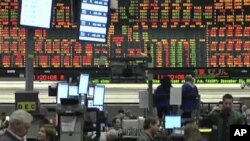The Chicago Board of Trade is the world's oldest futures and options exchange. There, commodities and other financial instruments are traded daily. As the clock ticks towards a deadline to raise the U.S. debt ceiling, traders believe a default on that debt is still highly unlikely, and are more concerned about the consequences of a potential downgrade of the U.S. credit rating.
In the debate about raising the limit on government borrowing in the United States, lawmakers acknowledge that failure could bring a default on the debts owed by the United States government.
But Scott Shellady, who watches investments for ICAP Energy in Chicago, says a true default is highly unlikely.
“I think the downgrade is what we should be talking about rather than default. We’re not going to default. We’ve got enough receipts that are coming in to meet our obligations. We’re using that word to get something done sooner rather than later,” Shellady said.
The United States has had the best possible credit rating, triple-A, since 1917. The main credit rating agencies say they are reviewing the U.S. government debt situation for a potential downgrade. The consequences of a downgrade would be far-reaching.
“We are going to have to attract buyers for our bonds to continue to pay our debts and run our government. The only way we can really do that is to give them a higher return. So our interest rates are going to have to go up to attract outside investors, and in doing so it’s going to drive everyone else’s interest rates up all the way down the line,” Shellady said.
Northwestern University Economics Professor Paola Sapienza says any savings from budget cuts could become irrelevant, if the U.S. defaults on its debt, or receives a credit rating downgrade.
“The irony of this is that if the yield [interest rate] goes up, some of the consequences would be spending to service the debt would go up, potentially by a large amount, affecting other types of services that need to be cut,” Sapienza said.
As the debate continues in Washington, traders on the floor of the Chicago Board of Trade are watching closely.
“The mood on the trading floor is subdued,” said Matthew Pierce, who analyzes commodity prices for GrainAnalyst.com.
“We would be extremely bullish right now based on the fundamentals alone, but because of the currency and debt issue, we have to keep that bullishness in check until we found out further information of whether we’re going to reach a deal or not,” he said.
August 2 is the deadline to reach an agreement. That’s when the U.S. Treasury says it will no longer have the money needed to meet all of its financial obligations.
“The closer we get to that date of having to have something done, it’s going to be a worse deal, and we’re going to have to either go through this in six months time, or eight months time, eighteen months time, or five years time, but we’re going to have to go through this again unless we have something significant as far as the cutting part goes,” Shellady said.
Even if lawmakers do reach an agreement to raise the debt ceiling and avoid default, credit rating agencies say the threat of a downgrade still exists without a long-term plan to fix the federal deficit.













